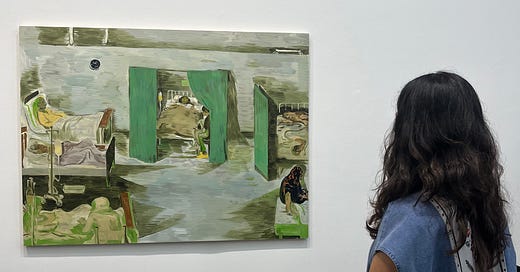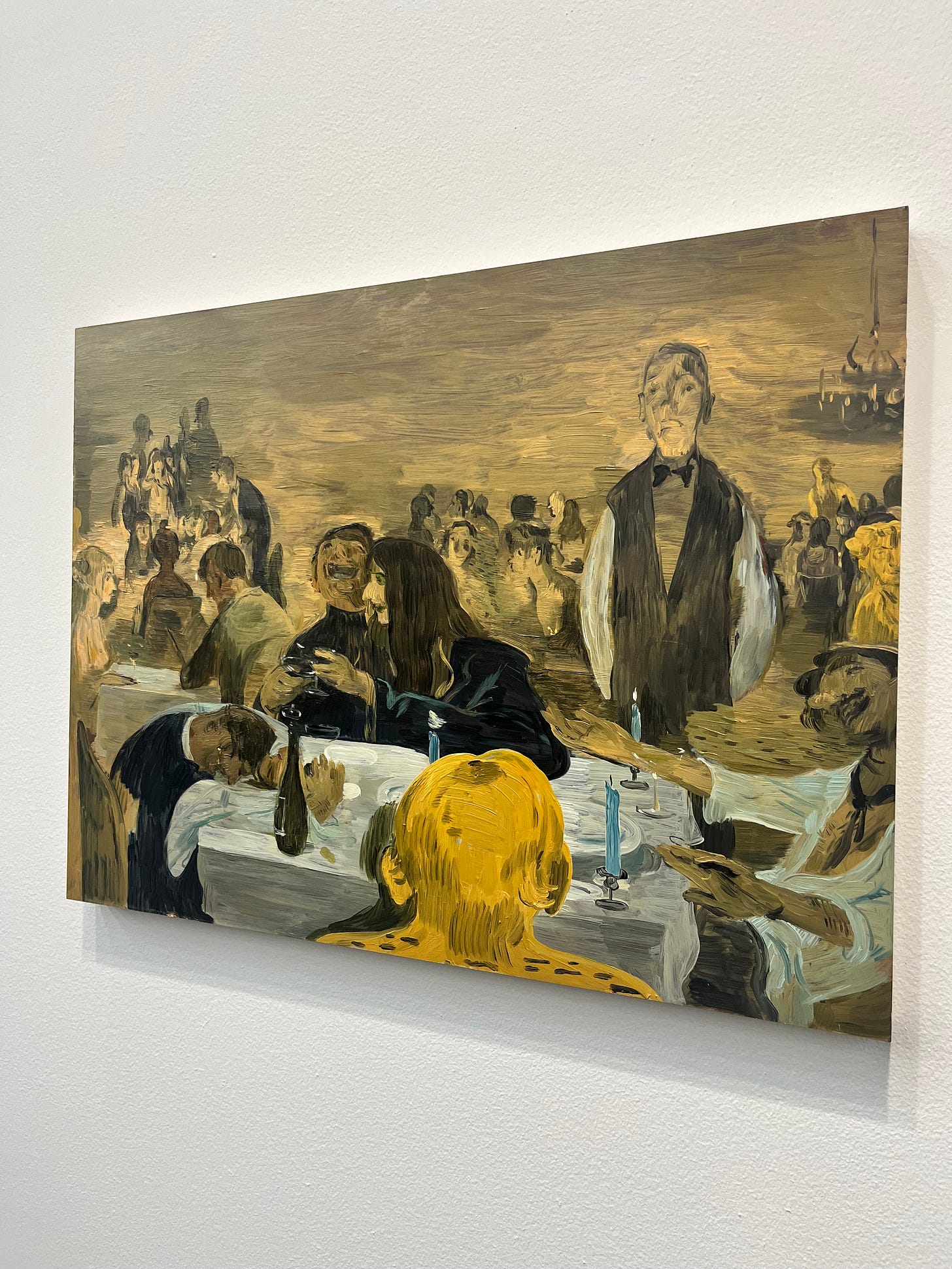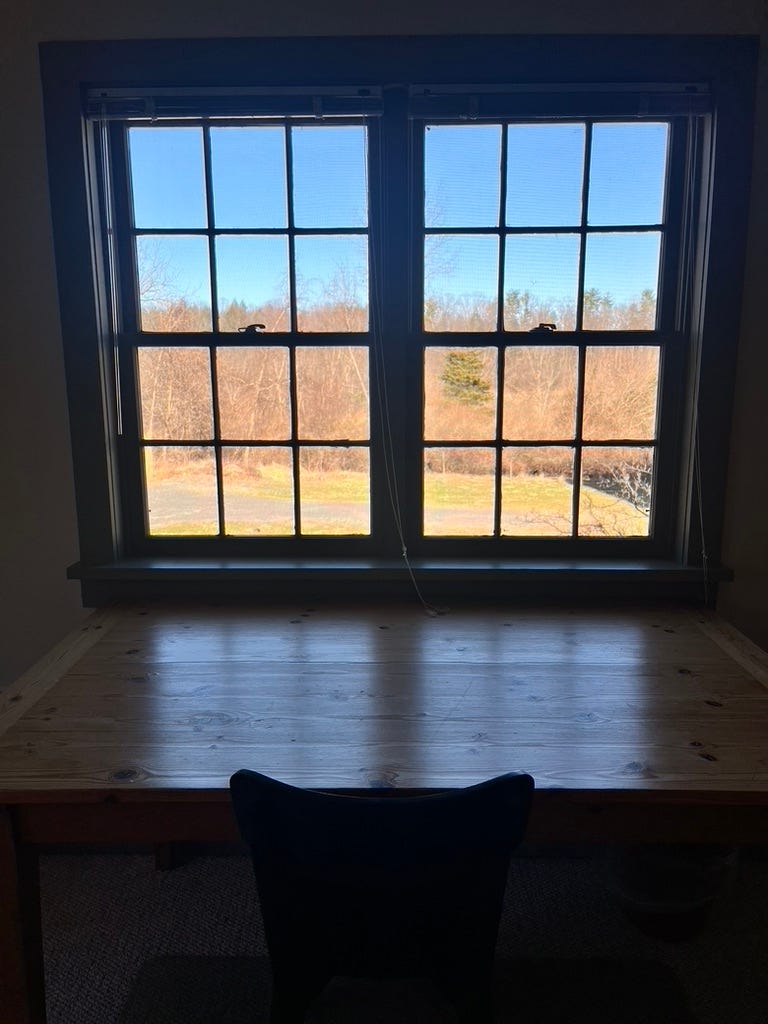Last week, I went to see the Pakistani artist Salman Toor’s latest work in Chelsea. The gallery was flooded with people, an assembly line of folks moving from one frame to another. There were friends I saw across the room that I couldn’t even say hi to, because it felt like trying to get to the other side of a club.
(Looking at Salman Toor’s The Ward)
The attention’s entirely deserved. Salman’s work takes European styles and trains them on entirely new subjects—a bedroom in Lahore, an Islamic cemetery, queer brown men, and so on. My favorite painting from the current exhibition takes a Pakistani hospital ward and turns it eerie and disconcerting through its lavish use of greens. Another fantastic one is called The Joke; it shows a group of friends losing themselves in raucous laughter at a restaurant, while a surly waiter looks on. Toor paints entirely from memory, and so even familiar, canonical scenes—the hospital ward, the cemetery—are turned into something stranger. Most of all, the paintings are an absolute joy to look at. The brush movements, the abundance of colors, the subtle humor, it’s all an intoxicating experience.
I once spoke to a friend from Lahore who’s known Toor’s work from years ago and is more partial to the earlier paintings. It can sometimes be hard to accept an artist’s more mature work, particularly if you found them at their rawest and simplest. My friend found the earlier work more relatable. That’s a word I’ve been turning over in my head a lot. I got that a lot with American Fever, my debut novel. People said it helped them feel seen in fiction. It gave a certain representation to a milieu, a place, a time. I’m happy to have provided that; mostly, the particularities of a work’s emotional impact on readers are none of my business. I say that in a very simple, matter-of-fact way. The interiority of the reader is sacred, and also none of the writer’s concern. At the same time, the word grates sometimes. Every time I have sought art for its “relatability” to my life, I have devolved into the narcissism of small differences—indexing and placing undue value on the things that are different between my experience and that of the character in the film or book. In the search for relatability, the art ends up feeling more alienating than familiar.
In any case, if you’re in New York, please go visit the Luhring Augustine gallery in Chelsea for Toor’s work. I plan on going again myself, so I can soak it all in at a more leisured pace.
(The Joke by Salman Toor)
My second novel, A Splintering, will be out this September in the UK. I am absolutely thrilled to share that it’s been getting phenomenal reviews from early readers. Yesterday I spied it as the most requested literary fiction title on Netgalley, a website that lets you request advance copies for reviews.
Writers I deeply respect have loved the book. Below are all people whose work has meant a great deal to me, whose stories and characters have bewitched me, some since adolescence, and others much more recently.
‘A lacerating novel by a writer of great insight and deep compassion’ — Mohsin Hamid, author of The Last White Man
‘Smart and gripping – I read it in one sitting. Tara is a glorious creation, crackling with life and aspiration and sensuality’ — Kamila Shamsie, author of Home Fire
‘A riveting read that boldly calls out patriarchy in Pakistan and beyond' — Muhammad Hanif, author of A Case of Exploding Mangoes
'An intoxicating, high-voltage mix of female rage, economic ambition, erotic awakening,and biting disdain aimed at the expectations faced by women in contemporary Pakistani society, Tara's voice will sear itself in your consciousness like the scowl of a convict facing the firing squad. Never have my sympathies been so roused, tested, and provoked by a character both heroic and tragic, wily and cornered, raw and charred... a magnificent sophomore novel, replete with Amna's trademark lyricism and sparkling wit' — Aube Rey Lescure, author of River East, River West
‘A Splintering is the dizzying kind of novel that puts every part of your brain in competition with the rest. It’s a page-turner, it’s a vivid chronicle of family life, it’s an intimate exploration of selfhood. And more than anything it’s an examination of the structures society builds up around us. In harrowing detail, Amna shows us how those forces—tradition, patriarchy, capitalism—deform and fracture our inner lives so profoundly that imagination becomes as much a prison as it is a key. I’m in awe of this book.’ — Chris Knapp, author of States of Emergency
If your attention is piqued, you can pre-order the book here or here for free international shipping to the US.
In April, I was at Art Omi, a wonderful residency near Hudson, NY, that selects writers from around the world. My cohort had the most brilliant writers, and it was bliss to be surrounded by people who were writing in languages other than English. Particularly in the age of pervasive internet, I find a lot of day-to-day English to be broken, turned sandy by the use of online lingo that begins to constitute speech. It was lovely, for example, to hear my Brazilian peer think out loud in an English that was clearly Portuguese in her head. A different register and idiom. It was a sacred and productive time, and the fact that it was not yet spring, everything outside my large windows dreary and cold, the trees all bald and stark, bark and stick, lent only added magic to my time there. Right after that, I was in Portland, Oregon, for a residency with the fantastic Tin House. I did a fun little reading there, and read from A Splintering. I also returned to the place that inspired American Fever, and it was surreal and beautiful and weighted.
(My writing desk at Art Omi)
And finally, a small hedonistic update. I tasted wild honey my parents brought from Pakistan, and it smelled and tasted like wood smoke in Pakistan and the fennel used in mouth fresheners. People say all these high-brow things about wine, how it tastes like the land. Turns out honey does as well.
Wishing you a happy summer,
Dure







congratulations on the advance praise, to have the likes of kamila shamsie and mohsin hamid on that list! do you have a favourite salman toor so far? asking out of curiosity